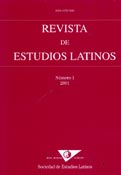How to exalt narcissism in verbal interaction (the role of the slave as a trigger for self-centered discourse in Plautus' Miles Gloriosus)
DOI:
https://doi.org/10.23808/rel.v6i0.87891Keywords:
Plautus; Miles Gloriosus; Pyrgopolynices; Artotrogus; narcissisme; interaction verbale.Abstract
Every self-centred discourse can run the risk of contravening some maxims of politeness. More specifically, the conversational narcissism generally comes into conflict with the Modesty Maxim, which suggests to minimize self praise. A clear classical literary example of conversational narcissism is found in Plautus’ Miles Gloriosus. In the opening scene, Pyrgopolynices is set as the braggart warrior by a conversation between him and his satellite Artotrogus. This parasite, who appears only in this scene, has just the role of promoting and carrying the warrior’s narcissism to a high degree of ridiculousness. We have analysed the various discourse strategies used by this character to obtain the confidence of his interlocutor and to increase the braggart warrior’s self praise. Relevant strategies are the repeated recourse to the predicate memini (‘I remember’) or expressions such as quod omnes mortales sciunt (‘what every mortal knows’), that have the clear function of assuring credibility to the empty boasting of the warrior.Downloads
References
BOOTH, WAYNE . C., 1974: Une rhétorique de l’ironie. Chicago, University of Chicago Press.
DUMONT, JEAN CHRISTIAN, 1993: «Le Miles Gloriosus et le Théâtre dans le Théâtre». Helmantica 44, 133-146.
FRAENKEL, EDUARD, 1960: Elementi plautini in Plauto, (trad. it di F. Munari). Firenze, La nuova Italia.
GAIDE, FRANÇOISE, 2001: «A propos des interactions verbales dans le theâtre de Plaute». C. MOUSSY (éd.), De Lingua Latina Novae Quaestiones. Louvain-Paris, Peeters, 959-969.
GARCÍA-HERNÁNDEZ, BENJAMÍN, 2001: Gemelos y Sosias. La comedia de doble en Plauto, Shakespeare y Molière. Madrid, Ediciones Clásicas.
GIANNICI, NADIA, 2002: «Il Miles Gloriosus di Plauto e Il Capitano di Ludovico Dolce». Pan 20, 237-252.
GRICE, H. PAUL, 1975: «Logic and Conversation». P. COLE - J. L. MORGAN (eds.), Syntax and Semantics Vol.3. New-York-San Francisco-London, Academic Press, 41-58.
KERBRAT-ORECCHIONI, CATHERINE, 1976: «Problèmes de l’ironie». Linguistique et Sémiologie 2, 9-46.
KERBRAT-ORECCHIONI, CATHERINE, 1984: «Pour une approche pragmatique du dialogue théâtral». Pratiques 41, 46-62.
KERBRAT-ORECCHIONI, CATHERINE, 1986: L’implicite. Paris, Éd. Armand Colin.
KNOX, NORMAN D., 1973: «Ironie» et «Sur la classification des ironies». Ph. P. Wiener (éd) Dictionnaire de l’histoire des idées. New York, Scribner, vol. II, 627-634.
LÓPEZ LÓPEZ, MATÍAS, 1991: Los Personajes de la Comedia Plautina: nombre y Función. Lleida, Publicacions de l’Estudi General.
MARALDI, MIRKA, 2000: «Some remarks on Latin free-choice indefinites». G. Calboli (ed.) Papers on Grammar V. Bologna, CLUEB, 109-124.
MARALDI, MIRKA - ANNA, ORLANDINI, 2001: «A case of negotiation: the argumentative concession». E. WEIGAND - M. DASCAL (eds.) Negotiation and Power in Dialogic Interaction. Current Issues in Linguistic Theory 214, 149-166. Amsterdam-Philadelphia, J. Benjamins.
MARALDI, MIRKA - ANNA, ORLANDINI, 2005: «Réactions adverbiales dans la comédie latine». A. Betten - M. Dannerer (eds.) Dialogue Analysis IX. Dialogue in Literature and the Media. Selected Papers from the 9th IADA Conference, Salzburg 2003 - Part I: Literature. Tübingen, Niemeyer, 361-372.
MARTIN, ROBERT, 1992: (2 ème éd.) Pour une logique du sens. Paris, Presses Universitaires de France.
MOESCHLER, JACQUES, 1985: Argumentation et conversation. Eléments pour une analyse pragmatique du discours. Paris, Hatier.
ORLANDINI, ANNA, 1994: «’Si non eo die at postridie’ une analyse pragmatique du connecteur latin at». Lalies 14, 159-175.
PERELMAN, CHAÏM - LUCIE, OLBRECHT-TYTECA, 1976: Traité de l’argumentation. La Nouvelle Rhétorique. Bruxelles, Éditions de l’Université de Bruxelles.
PETRONE, GIANNA, 1989: «Campi Curculionii, ovvero il bestiario del parassita». Studi Italiani di Filologia Classica LXXXII Annata, Terza Serie, vol.VII, 34-55.
SPERBER, DAN - DEIRDRE, WILSON, 1978: «Les ironies comme mentions». Poétique 36, 399-412.
SPERBER, DAN - DEIRDRE, WILSON, 1981: «Irony and the Use / Mention Distinction». P. COLE (éd.), Radical Pragmatics. New York, Academic Press, 295-318.
Downloads
Published
How to Cite
Issue
Section
License
Copyright (c) 2006 Revista de Estudios Latinos

This work is licensed under a Creative Commons Attribution-NonCommercial-NoDerivatives 4.0 International License.
The originals published in the printed and electronic editions of this journal are the property of the Revista de Estudios Latinos and can be circulated as long as the original source and authorship is made clear in any reproduction, full or partial, of the same, and as long as this is not done for commercial purposes.






